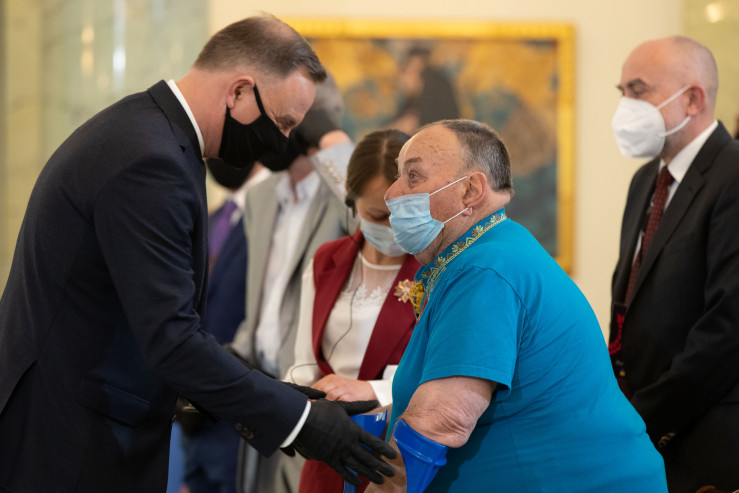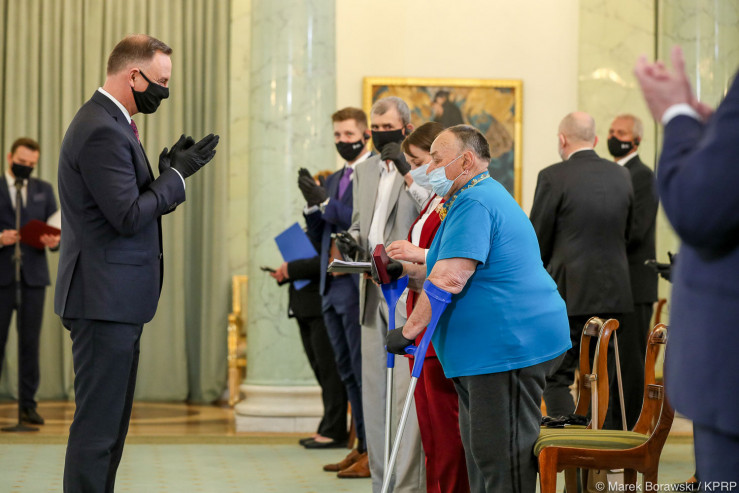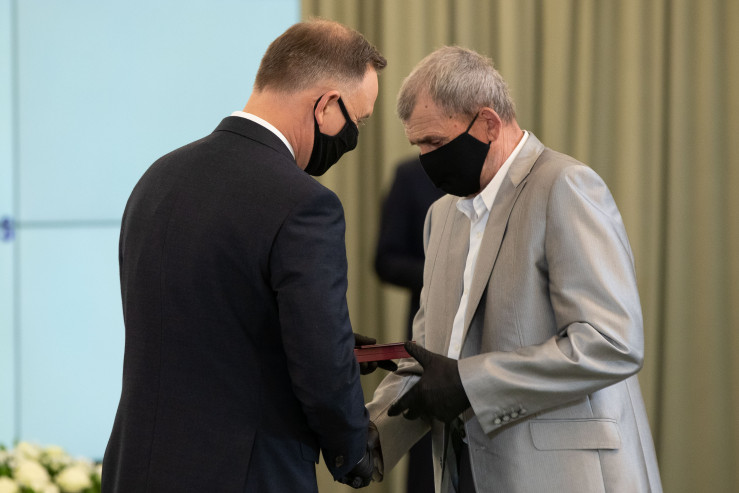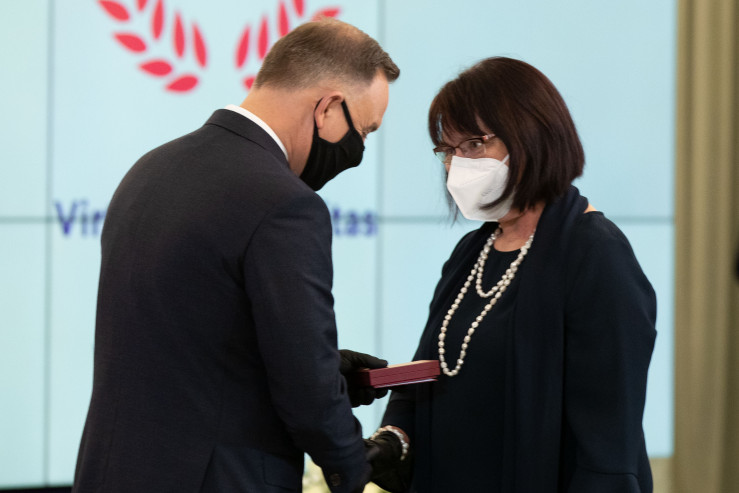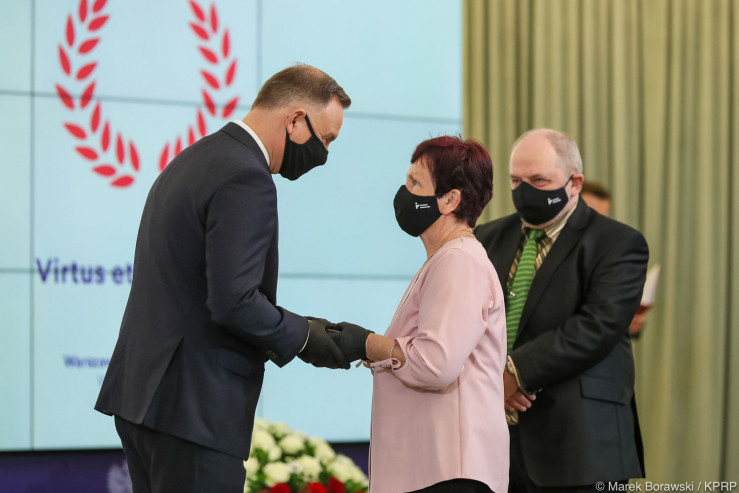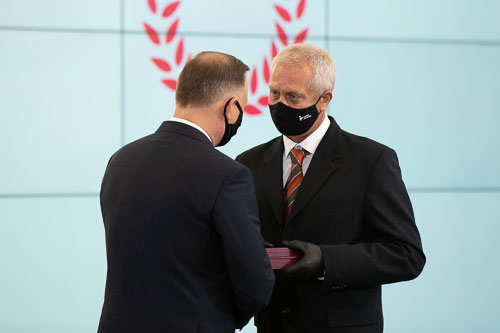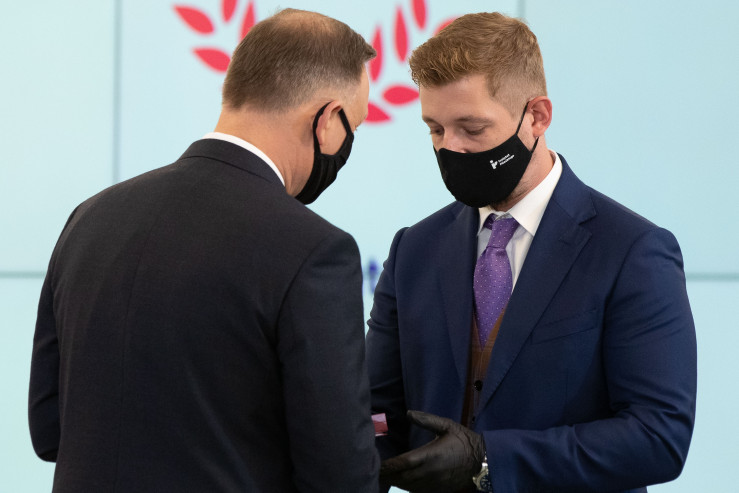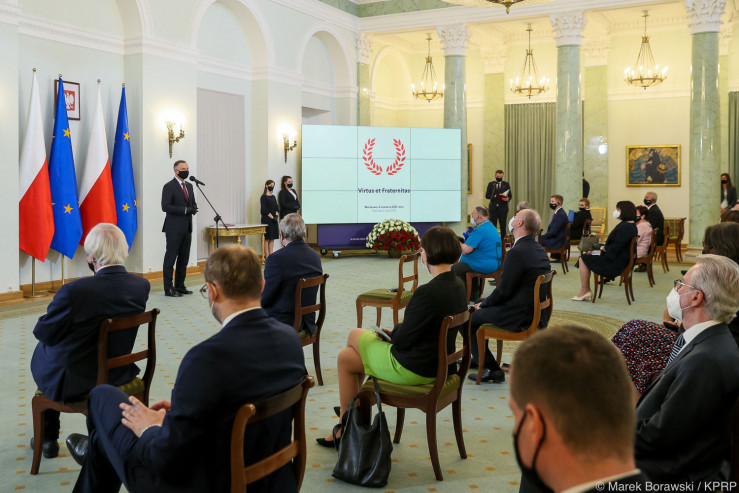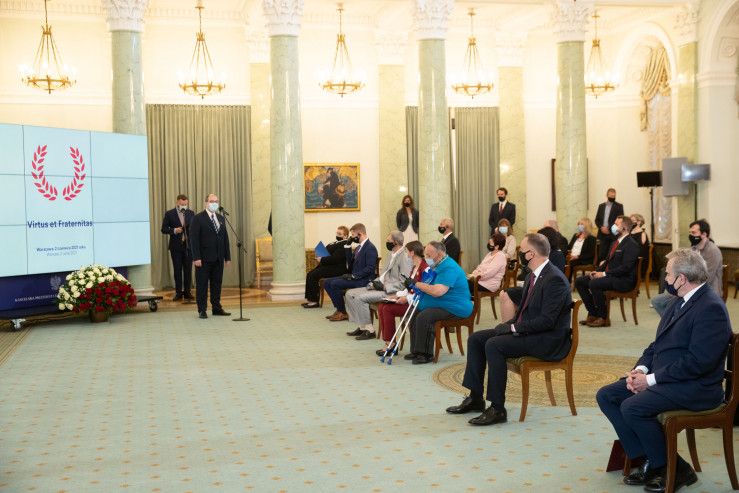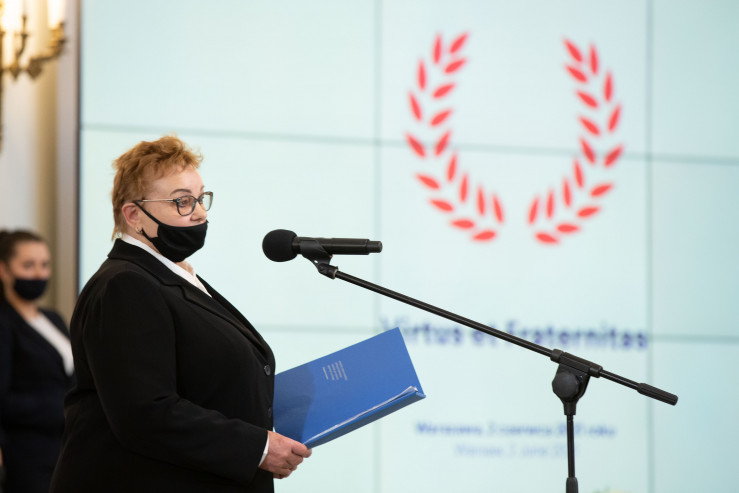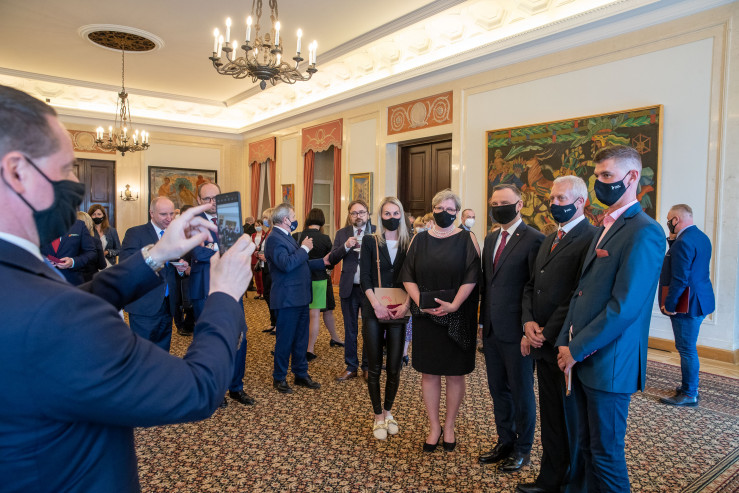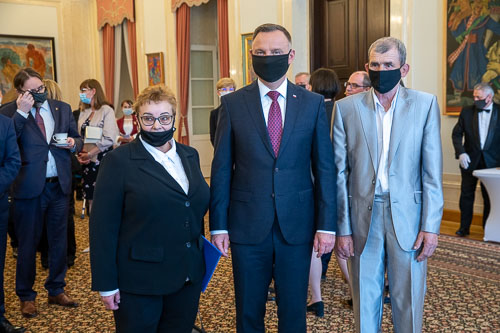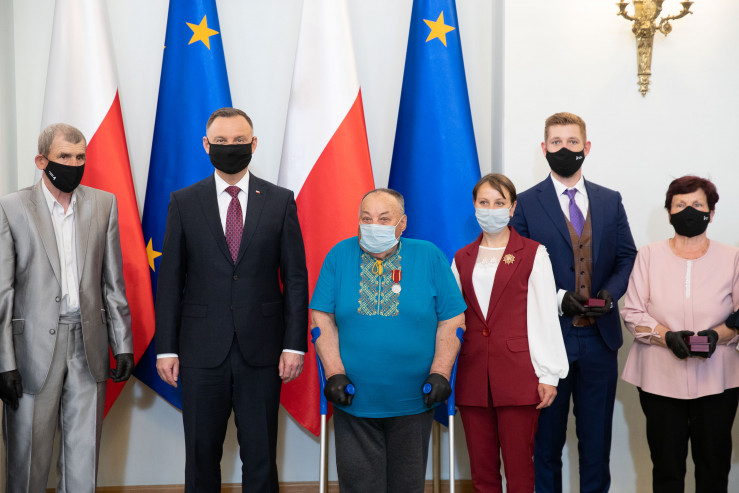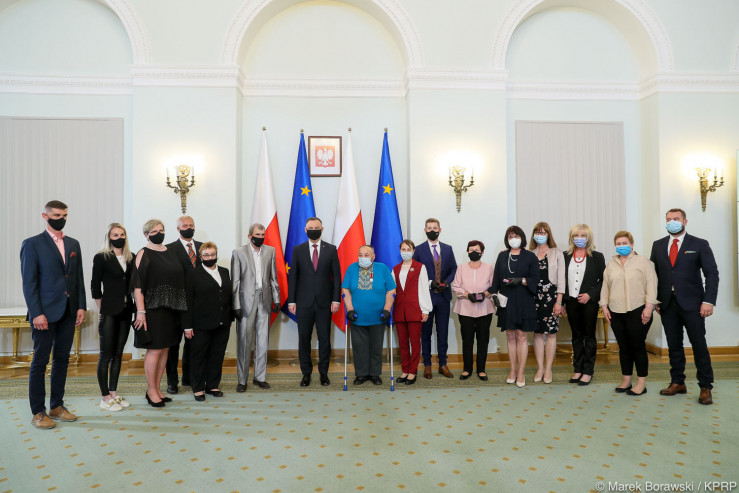The Virtus et Fraternitas Gala 2021. Meet all the recipients! - Instytut Pileckiego
The Virtus et Fraternitas Gala 2021. Meet all the recipients!
The President of Poland Andrzej Duda awarded the medals to foreigners who provided aid to Polish citizens during the 20th century, in times of both war and peace.
The decoration was awarded at the request of the Pilecki Institute to nine persons from the Czech Republic, Slovakia, Romania, Ukraine and Hungary.
The times were not conducive to altruism or noble ideals: the century saw two world wars, revolutions, ethnic cleansings, political persecution and the crimes of two totalitarianisms. But even under these tragic circumstances there were those who gave shelter, shared food, fought for better conditions at refugee camps, issued false documents that could prevent their bearers from being arrested or risked ill-treatment at the hands of communist functionaries with their unwavering attitude. Not only did they help Polish citizens, but also showed solidarity with the persecuted in the face of danger, even though they had little in common, as they didn’t share blood ties, nationality or religion.
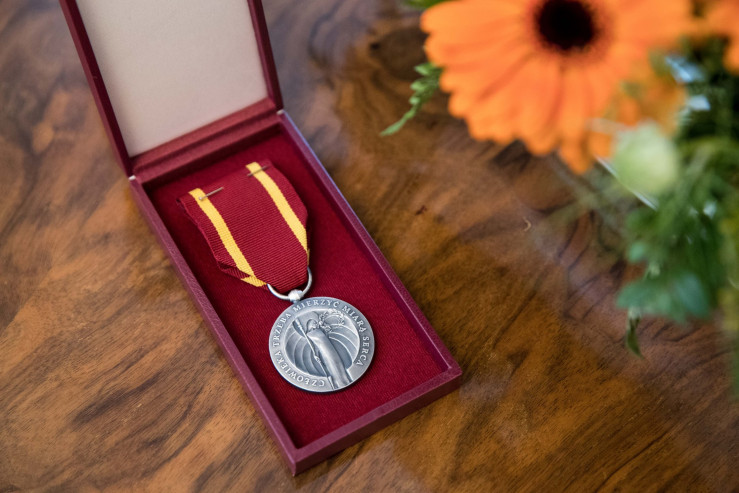
The Pilecki Institute saves these stories from oblivion: we analyze and verify testimonies, accounts and hundreds of official documents, as well as search for witnesses and descendants of both those who provided help and those who received it. Based on our research findings, the Director of the Pilecki Institute, Dr. Wojciech Kozłowski – having obtained a favorable opinion of the Council of Memory – submitted a motion to the President of the Republic of Poland Andrzej Duda to award the Virtus et Fraternitas medal to candidates from the Czech Republic, Romania, Slovakia, Ukraine and Hungary. The families of the nominees were present at the ceremony that took place on 2 June at the Presidential Palace.
The Pilecki Institute put forward nine candidates:
► Maria Bazeluk (1903–1956) and Petro Bazeluk (1903–1949)
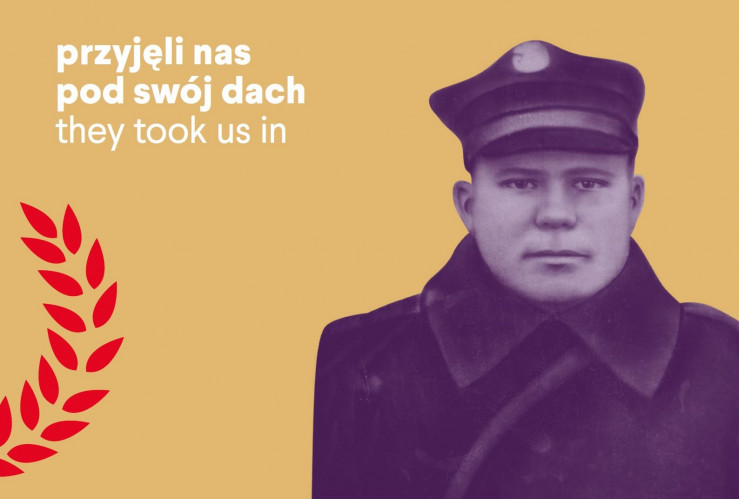
Mykola Bazeluk said that there was no difference between who was a Pole and who was a Ukrainian in Volhynia before the war. That all changed in 1943, when, as he put it, “Brother turned on brother.”
At the time, he was living with his father Petro Bazeluk, his mother Maria and his two siblings near the village of Buteiky. The war had been raging for four years already, and the German policy that sought to take advantage of the dislike of Ukrainians for Poles was beginning to bear bloody fruit. The Bazeluks heard the news of the massacres of Polish villages in Volhynia that had been carried out by the Ukrainian Insurgent Army.
In July 1943, the village of Huta Stepańska fell victim to Ukrainian Insurgent Army, and the wife of Mieczysław Słojewski was killed in the massacre. Mieczysław and his son Edward survived and fled to the forest to hide. The growing cold, hunger and fear of the Ukrainians drove them to their limits. In November 1943, the Słojewskis happened upon an old acquaintance in the forest, Petro Bazeluk. The Poles were terrified of the man with the ax in his hand, and Petro said to Mieczysław, “Don’t be afraid, come with me.”
Bazeluk and his wife Maria hid the Poles in their barn, where they lived from November 1943 until April 1944. The Bazeluks were risking not only their own lives, but the lives of their children as well. The Słojewskis were never discovered, however, despite numerous searches of the property by the Ukrainian Insurgent Army. The Bazeluks gave their refugees security and a semblance of a home; Maria taught Mieczysław and Edward how to knit, thus enabling them to make their own gloves, socks and jumpers for themselves and for their carers.
After the war, the Słojewskis moved to Lower Silesia. Petro Bazeluk remained in Buteiky, where he was shot in 1949 by a Soviet official for refusing to comply with forced collectivization.
► Ecaterina Olimpia Caradja (1893–1993)
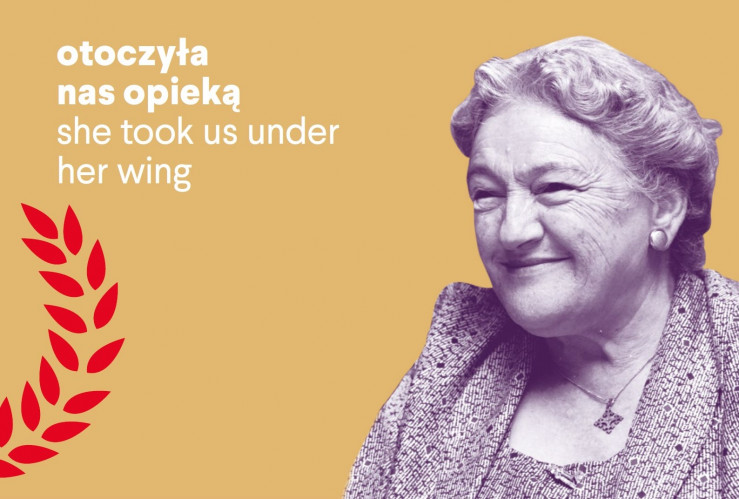
The issue of “Kurier Polski” published in Bucharest on 3 December 1939 was full of alarming headlines: “The Soviet attack on Finland”, “The Polish struggles. Executions and deportations.” One of them, however, gave people hope: “Under the care of Princess Caragea. Home for mothers and children.” The article described the fate of the children of Polish refugees in Romania – “small, petite, innocent children, who were forced to roam since the very beginning of their lives.” Fortunately, “they found a kind guardian” – Princess Ecaterina Olimpia Caradja.
The Romanian aristocrat and philanthropist was head of the charitable Association of Saint Catherine’s Cribs. On 24 September 1939, she provided Polish families in Bucharest with access to two buildings, including a spacious pavilion, with nurseries, playrooms and a reading room for children. The youngest received four meals a day. A Polish school was established right away. The establishment provided refuge to 120 Poles. As a representative of the Save Children Found, Caradja also distributed clothes for children among other refugee communities.
The princess often intervened with the Romanian authorities to provide greater support to the Polish refugees. She collaborated with Paul Super, who supervised the American aid to Poles in Romania. While some of the refugees left Romania for other countries before the end of the war, the rest returned to Poland in 1945.
In 1952, Caradja was forced to flee from Communist Romania to the United States. She returned to her homeland shortly before her death. On account of her support for the Allied soldiers who had been taken prisoner, she was referred to as the “Angel of Ploiești.” She was also an “angel” to the Polish children. “Kurier Polski” described her as having “great energy, an unfailing smile, a kind word for everyone, and a willingness to compassionately hear out everyone’s struggles.”
► Jenő Etter (1897–1973)
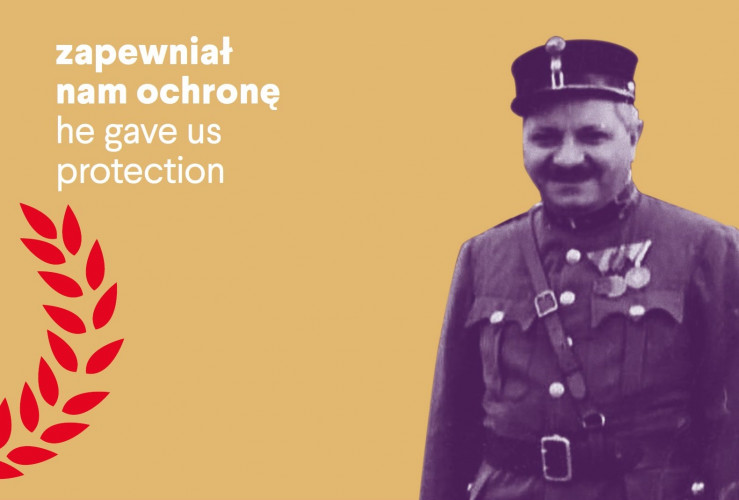
The mayor of the Hungarian city of Esztergom received dozens of letters written in Polish that showed the sympathy and gratefulness of the Polish refugees: “Dear Captain!”, “Dear Doctor!”. Jenő Etter understood them all; he had served and been wounded on Polish land during the First World War, he had seen the destruction left behind by the sweeping front lines. When the next war broke out, he learned the Polish language and set out to help Polish citizens.
On 18 September 1939, Hungary opened its borders to Polish refugees, allowing over 120,000 people to enter the country. An internment camp for Polish soldiers and civilians was established in Esztergom. In his role as the local prosecutor, and from 1941 as the mayor of the city, Jenő Etter actively strove for the best possible living conditions and supplies for the Polish refugees, even putting a municipal resort at their disposal. He helped 5,000 Poles to flee to the West and the Middle East, where they joined the Polish Armed Forces. He also gathered information about their lives in Hungary, which he later sent to the Allies, and protected the members of the Polish resistance. When the Germans occupied Hungary in March 1944, he issued false documents to protect the Poles from arrest, and defended Jews by officially opposing the establishment of a ghetto in his city.
This all led to his arrest by the Gestapo on 19 March 1944. His friends in high places managed to have him freed and placed him in the military. He was sent to the eastern front and taken into Soviet captivity. After the war, József Antall, who together with Henryk Sławik, rescued Poles and Jews in Hungary, recalled: “Etter showed great involvement and sacrifice in helping the Polish refugees in need; it required no small risk on his part.” When Dr Jenő Etter returned from the Soviet POW camp, the Communist authorities forbade him from fulfilling any kind of public office. He worked as a doorman until his retirement.
► Petro Hrudzevycz (ur. 1939)
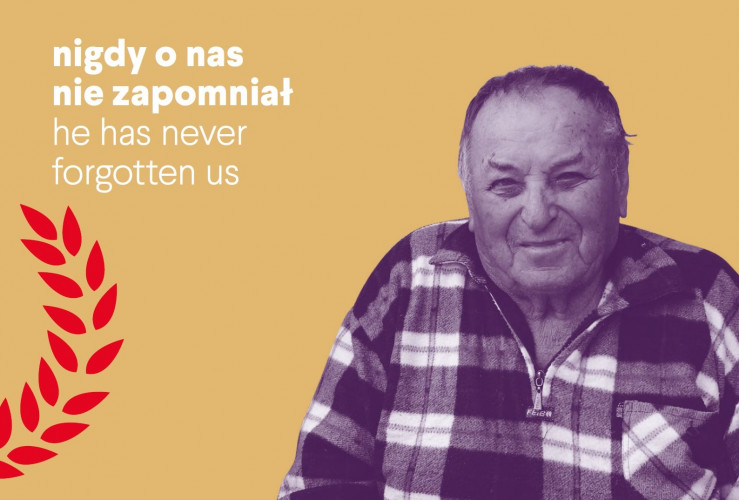
Petro Hrudzevych conscientiously discharged his duties. As a truck driver in a kolkhoz in the village of Dytiatyn in the Ivano-Frankivsk Oblast in the west of Ukraine, he transported inhabitants of the area to work in the fields.
However, in 1986 the local Soviet functionaries called Petro and told him, “The cross has to be taken away. Either to the forest or to the river.” The cross was standing on the grave of some 100 soldiers of the Polish Army who had fallen in Dytiatyn on 16 September 1920, fighting the Bolsheviks to the end in a battle known as the Polish Thermopylae.
Hrudzevych replied to the apparatchiks: “I won’t take the Polish cross away. Neither to the river nor to the forest.” The residents of Dytiatyn remembered about the fallen Poles, and each year the local children would place flowers on their grave. “I wasn’t afraid. I attend the orthodox church, I’m a believer,” Petro later recalled.
The authorities had criminal prisoners remove the cross to the premises of Dytiatyn’s orthodox church. Petro was punished for his resistance with harder work in the kolkhoz. For a few years, day in day out, he went from village to village loading the truck with 100-liter milk cans. But it didn’t last long. “He came home in such a state that we had to pull him out of the truck. Something cracked in his spine. He spent three days in bed, and my sister and I had to turn him over, because he was unable to get up. It was since then that his health began to fail. It got only worse…” – recalled Petro’s wife Olha Hrudzevych.
A massive spinal cord injury led to permanent disability. Despite his poor health, each year Petro Hrudzevych attends the commemoration of the battle of Dytiatyn. The rescued cross is now standing in the square in front of the local orthodox church.
► Anna Jelínková (1918–2009) and Jan Jelínek (1912–2009)
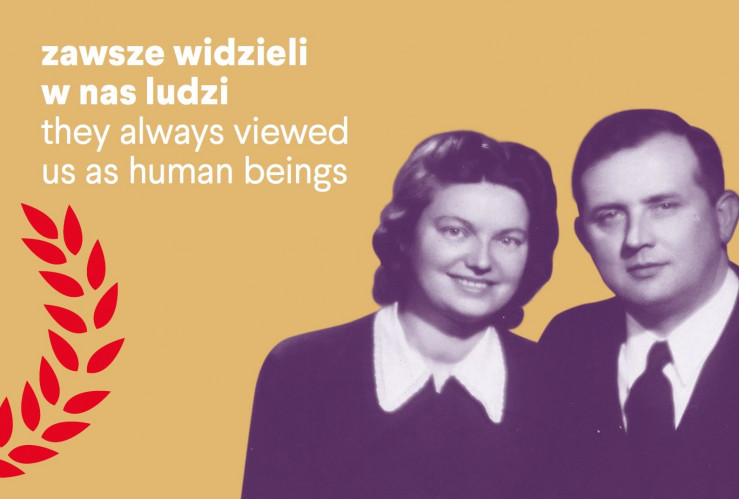
In 1937, the care of the Evangelical parish in Kupiczów, Volhynia, was entrusted to Jan Jelínek. The young pastor quickly won the hearts of the local Czechs, who had settled there in the 19th century. He preached love of neighbor regardless of his nationality, religion and beliefs, not obvious with Europe on the brink of war. When it broke out, Jelínek modeled himself on the Good Samaritan.
In 1939 he provided shelter for Polish soldiers fleeing Soviet occupation to Romania. When the Germans replaced the Soviets as the occupying power, Jelínek began hiding Jews in his house and bringing food to the Kowel ghetto. “I was helping a human being,” he responded to a German officer who threatened him with death for rescuing Jews. Jelínek was supported by his wife Anna, whom he married in 1942. During the Volhynia Massacre they gave shelter to Poles from the villages attacked by Ukrainian nationalists. Jelínek’s example inspired his Czech parishioners – Kupiczów became a haven for Poles. When in 1944 the Germans were repelled by the Soviets, Jelínek issued false birth certificates to people in danger of arrest by the NKVD.
During the war the Jelíneks saved over 40 people in total, mostly citizens of the prewar Poland: the Jewish families of Fischer and Fronk, the Polish Siekierskis, Feliks Zubkiewicz, whose relatives were killed by the Ukrainian nationalists, and the Ukrainian family of Lutsyuk.
The Jelíneks left Volhynia with the Czechoslovak Army Corps that fought alongside the Red Army. After the war they settled in Oráčov, western Czechoslovakia. Jan was persecuted for his beliefs by the Communist authorities – his health deteriorated, but both spouses lived to a ripe old age.
► Žofia Lachová (1907–1979) i Jozef Lach (1905–1993)
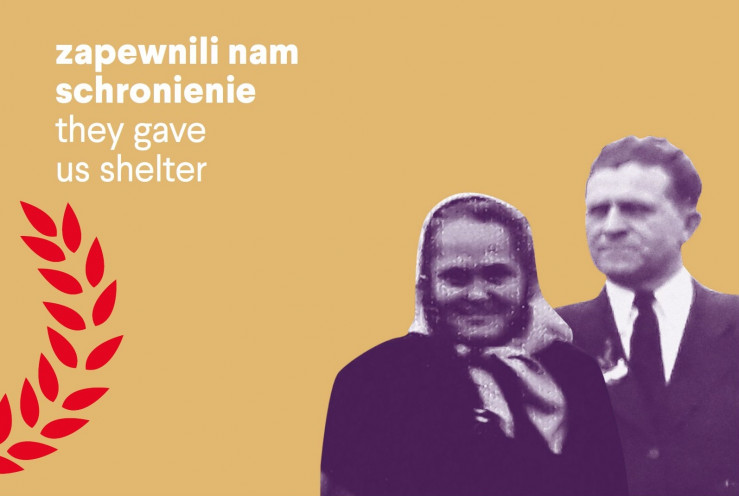
One night in October 1939, four men knocked on the door of Jozef and Žofia Lach’s home in Poprad, Slovakia. They came from the nearby Tatra Mountains, from occupied Poland. They gave Jozef a letter from his good friend, Jozef Kertész, asking Lach, a taxi driver, to transport the Polish airmen to the Hungarian border. This is how Lach started to help Poles who wanted to get to Hungary through Slovakia. The number of refugees was growing so fast that he recruited other taxi drivers to help. Soon he started transporting couriers and underground activists in the opposite direction – towards the Polish border. He also obtained forged Slovak documents for his passengers.
While Jozef took charge of the transport, his wife Žofia set up a hideout in their house. Despite having children, they risked getting arrested by the Slovak authorities who were subordinate to the Germans and continued to give shelter to Polish refugees, treating them like their own family.
With time, the Lach family gained the trust of Józef Krzeptowski – the “king of the Tatra couriers.” When his wife, father-in-law and brother-in-law were in danger of getting arrested by the Germans, Jozef Lach transported them across the border to Poprad, where they survived by hiding in the Lachs’ house for several months. The Poles would call their house a “hotel for couriers.”
Jozef was captured only once, in the summer of 1943, when Slovak gendarmes cut him off on the road near the village of Veľká Franková. His Polish passengers and the British agent whom they were escorting managed to jump out of the taxi and escape, but Jozef and his son were arrested. They were released only thanks to the kindness of the commandant who decided not to hand them over to the Gestapo.
The courage and selflessness of Jozef and Žofia Lach helped save many Poles and ensured that the transit route to Poland was in use until almost the end of the war. The Lachs were later nominated for a number of Polish decorations, but Communist Czechoslovakia refused to back this effort.
Here you can learn more about the stories of all recipients of the Virtus et Fraternitas medal.
See also
- We know the names of the Virtus et Fraternitas Medal recipients | 2024
We know the names of the Virtus et Fraternitas Medal recipients | 2024
On 17 December 2024, the Virtus et Fraternitas Medal ceremony was held for the sixth time at the Belweder Palace in Warsaw. The award was given to 10 people from the following countries: Austria, Norway, Slovakia and Hungary.
- Virtus et Fraternitas Medals awarded | Discover the stories of heroic Ukrainians who saved their Polish neighbors during the Volhynian Massacre
Virtus et Fraternitas Medals awarded | Discover the stories of heroic Ukrainians who saved their Polish neighbors during the Volhynian Massacre
On 6 July 2023, at the Belweder Palace in Warsaw, fifteen heroic Ukrainians were commemorated for saving their Polish neighbors from death at the hands of the Ukrainian Insurgent Army (faction of the Organization of Ukrainian Nationalists) during the Volhynia Massacre.
- We now know the names of the Virtus et Fraternitas Medal recipients
We now know the names of the Virtus et Fraternitas Medal recipients
On 20 December 2022, at the Belweder Palace in Warsaw, we honored Ilona Andrássy, Trofim Daneliuk and the Skakalski family, who demonstrated courage and solidarity with the persecuted when Poland was attacked by two murderous regimes, and the Polish citizens were in grave danger.
- Virtus et Franternitas Medals presented
Virtus et Franternitas Medals presented
The third edition of the Virtus et Fraternitas Medal Gala took place on 15 June 2022. This time, at the request of the Director of the Pilecki Institute, the President of the Republic of Poland bestowed medals on a total of 23 people.
- Walenty Jabłoński, doctor and an exile in Siberia, is dead
Walenty Jabłoński, doctor and an exile in Siberia, is dead
We are sad to learn of the death of Walenty Jabłoński, an exile in Siberia, participant of the Union of Siberian Exiles in Białystok. He was deported to a kolkhoz in Kazakhstan in 1952, where he was saved from starvation and death by Tassybaj Abdikarimow.
- Virtus et Fraternitas Medal
Virtus et Fraternitas Medal
The Virtus et Fraternitas Medal is a token of gratitude of the Republic of Poland for rescuing its citizens in times of the country’s greatest distress.
- The President of the Republic of Poland decorates recipients with the Virtus et Fraternitas Medal
The President of the Republic of Poland decorates recipients with the Virtus et Fraternitas Medal
The Virtus et Fraternitas Medal has been bestowed for the first time in history in June 2019. The awards were given by the President of the Republic of Poland, Andrzej Duda, acting on a motion of the Pilecki Institute.
